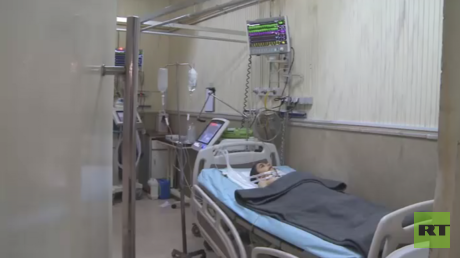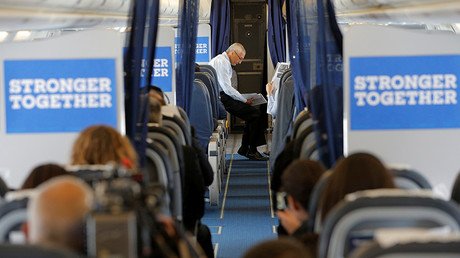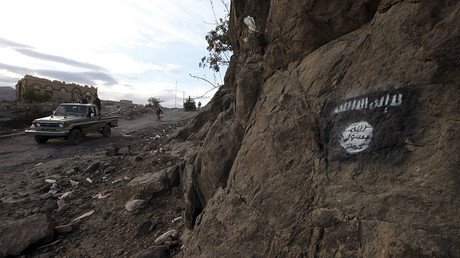Plight of western Aleppo, Dakota pipeline protests & Flydubaigate: Underreported stories of 2016

Stories that do not fit into the MSM narrative or are deemed damaging to the image of western governments and their allies often garner little to no media coverage. Here are some important stories extensively covered by RT but ignored by the MSM in 2016.
How civilians suffered in western Aleppo
Aleppo in Syria was split between the government and the militants after the occupation of eastern parts of the city by armed rebel groups in July 2012. While there was daily shelling in western Aleppo killing civilians and several radical Islamist groups blocking and brutally dealing with people in the east, the mainstream media chose to focus on what they said were atrocities by Syrian and Russian forces in eastern Aleppo every time air raids were reported there.
Based on unverified accounts of spurious groups and anti-government activists, the MSM reporting drew a grim picture of the regime killing its own people, and the Stalingrad-like images of devastation from militant-held neighborhoods became the face of the largest Syrian city. Meanwhile, the western part of the city was never shown.
RT became one of the few foreign broadcasters that actually had correspondents risking their lives on the ground in Aleppo, who brought underreported militant shelling of populated areas, the suffering of the people and stories of their daily lives to the world’s attention.
RT’s Lizzie Phelan and Murad Gazdiev visited hospitals that received civilians injured in numerous shelling attacks carried out by the militants from east Aleppo that were insistently called “moderate” by the Western media. They also spoke to the Aleppo residents and doctors sharing the real stories about what happened on the ground in the war-torn city. RT Arabic’s Somar Abudiyab was among those injured in the shelling of a Russian military mobile hospital on December 5, which killed two Russian medics and severely injured a pediatrician. The attack on doctors prompted no condemnation in the West.
RT also reported on the evidence of chemical weapons used by some extremist groups entrenched in Aleppo – the issue that the MSM painstakingly avoided.
What Podesta emails on WikiLeaks actually contained
A month before the November US presidential election, the whistleblowing site WikiLeaks began publishing emails from the account of Hillary Clinton’s campaign chair, John Podesta.
READ MORE: ‘Obama betrayer & false promiser’: Sanders blasted in #PodestaEmails 27
The news received huge coverage, but quickly focused on claims that Russia was behind the alleged hacking of the email server to propel Clinton’s Republican rival, Donald Trump, into the White House.
RT opted to actually browse through the 55,000 emails, which revealed the inner workings of the Clinton campaign, the Democratic candidate’s cozy relationship with members of the American political press and the infamous Wall Street speech transcripts.
The emails also shed light on some dirty tricks, including the “Russian card” Clinton planned to use to beat her rival in the presidential race, Donald Trump, as well as to deflect public attention from her own mistakes.
What Bernie Sanders rallies really looked like
Bernie Sanders gave the Democratic favorite Hillary Clinton a real battle for the presidential nomination. It is, however, speculated that the Vermont senator could have done even better if his campaign events received more attention in the American media.
In January, Sanders’s supporters launched “a nationwide rally” for their candidate as thousands of people took to the streets across 35 cities in the US. The massive event was ignored by the mainstream media, which decided to focus on the East Coast blizzard instead, making social media and RT the prime sources of information about Sanders’s campaign at the time.
But by April, after a series of huge Sanders rallies, the MSM grudgingly started to cover them – at least to some extent. A rally held by Sanders’s supporters in New York City was called “one of the largest” in the presidential campaign by the Washington Post.
How Yemen was devastated by Saudi coalition strikes
With attention of the world firmly glued to the Syrian conflict, the military campaign carried out by Saudi Arabia and its allies against the Houthi rebels in Yemen was largely left out of the spotlight.
RT extensively reported on the deadly Saudi airstrikes against civilian targets in the country, carried out with ammunition sold to Riyadh by the US and UK. In March, an attack on Mastaba market killed 97 people, while the bombing of a funeral hall in capital Sanaa left at least 100 civilians dead and more than 500 wounded in October.
RT was one of the first media outlets to learn that Britain was arming Saudi Arabia in the Yemen conflict, providing support for a war that top Yemeni academics based in the West have condemned as “illegal.”
RT also managed to get the perspective of the Yemeni ex-president, Ali Abdullah Saleh, on the conflict that broke out in his country. Saleh said he believes there is no difference between the “Saudi regime” and terror groups like Islamic State or Al-Qaeda.
READ MORE: 140 killed & 525 injured after reported Saudi-led airstrike hits funeral in Yemen
What caused US nationwide prison strike
RT was also among the few media outlets that covered what was described as one of the largest prison strikes in US history, which was nonetheless hardly reported in the mainstream media.
More than 24,000 inmates in at least 40 prisons from over two dozen states, including California, Florida, Alabama, Michigan and South Carolina, refused to follow orders in September, failing to report for work and causing prisons to go on lockdown.
The strike was held with the major goal of reforming prison conditions and forming a prisoners’ union, as some correctional facilities in the US witnessed “suicides every 60 to 90 days,” according to activists from many grassroots organizations working inside and outside these facilities.
Why Snowden called new UK snooping law ‘scary’
While the MSM eagerly demonized Russia for passing an anti-terrorism law in June, which particularly dealt with the issue of collecting data on people’s online activities, the West stayed almost silent about the new spying legislation in the UK, which was denounced by its critics as the greatest invasion of privacy known to the British people and called “scary” by Edward Snowden.
RT did not only get the gist of the new law but also discussed its possible effects on the privacy rights with experts in the field.
The legislation, dubbed the “snooper’s charter,” was passed by the British parliament in November. It authorizes the government to hack into devices, networks and services in bulk, and allows for large databases of personal information on UK citizens to be maintained.
It requires internet, phone and communication app companies to store customers’ records for 12 months and allow authorities to access them on demand.
READ MORE: Spies could hack entire towns under new surveillance bill
That data could be anything from internet search history, calls made or messages sent, and will be available to a wide range of agencies, including the Department for Work and Pensions as well as the Food Standards Agency.
Security agencies will also be able to force companies to decrypt data, effectively placing limits on the use of end-to-end encryption.
#Flydubaigate: Why airline pilots may fall asleep mid-flight
After a FlyDubai flight carrying Russian tourists from the UAE to Rostov-on-Don crashed in March while trying to land in difficult weather conditions, killing 62 people, RT offered a platform for whistleblowers from several Gulf States-owned airlines to speak out about the abuses they suffered on the job for reporting fatigue.
After the first Flydubai whistleblower contacted RT, some 60 people claiming to work or have worked for that airline and Emirates contacted us with allegations of pilot fatigue and airline intimidation.
Crucially, many of the pilots described being discouraged to file reports, as there was usually no official response, except for occasional threatening “warnings.” One of the pilots, who spoke with RT on condition of anonymity, said that complaints of fatigue “end up” at the UAE’s General Civil Aviation Authority (GCAA), but generate no result.
The absence of proper oversight has left pilots with no higher authority to complain to, and any reports that do get out are usually quickly “covered up,” according to the former pilot, who stressed that such misconduct would be impossible at European or US airlines, where independent aviation watchdogs monitor procedures. Despite that, some of their western colleagues said the problem of fatigue does exist in airlines around the world.
However, while RT extensively covered the issue that should have sparked concern over the safety of thousands of passengers around the world, the MSM paid no attention whatsoever.















